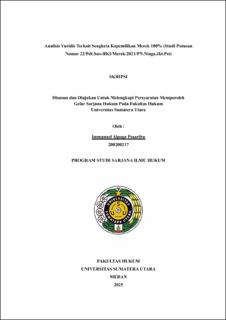Analisis Yuridis Terkait Sengketa Kepemilikan Merek 100% (Studi Putusan Nomor 22/Pdt.Sus-HKI/Merek/2021/PN.Niaga.Jkt.Pst)
Legal Analysis of 100% Trademark Ownership Dispute (Decision Study Number 22/Pdt.Sus-HKI/Merek/2021/PN.Niaga.Jkt.Pst)

Date
2025Author
Pasaribu, Immanuel Alpoga
Advisor(s)
Azwar, Tengku Keizerina Devi
Sukarja, Detania
Metadata
Show full item recordAbstract
A trademark is a sign in the form of an image, logo, name, word, letter, number, color arrangement, sound, hologram, or a combination of 2 or more of these elements to distinguish goods and/or services produced by a person or legal entity in the trading of goods and/or services. In the writing of this thesis, a decision will be used as a reference in writing. The formulation of the problem in this thesis are: how to protect the legal protection of the ownership rights of well-known brands that are not registered in Indonesia according to Law Number 20 of 2016 concerning Marks and Geographical Indications, how to resolve trademark ownership disputes over the infringement of trademark rights in similar classes of goods/services, as well as how to analyze the legal considerations and decisions of judges on trademark ownership rights dispute cases in court Decision number 22/Pdt.Sus-HKI/Merek/2021/PN. Niaga.Jkt.Pst. The research method used in this research is a normative research method with a descriptive research nature. The decision analyzed in this thesis is Decision number 22/Pdt.Sus-HKI/Merek/2021/PN. Niaga.Jkt.Pst and related laws and regulations, namely Law Number 20 of 2016 concerning Marks and Geographical Indications. Based on the legal analysis that has been carried out on the Decision number 22/Pdt.Sus-HKI/Merek/2021/PN. Niaga.Jkt.Pst, which is a case of trademark dispute 100% owned by Saule, LLC (Plaintiff) with a 100% trademark owned by Jefrie Permana (Defendant), it can be concluded that the decision is in accordance with Law Number 20 of 2016 concerning Trademarks and Geographical Indications. The Judge ruled that the Defendant's 100% trademark was cancelled because the Plaintiff's 100% trademark proved to be a well-known brand. Then, there are similarities both from the logos and the type of goods/services of the two brands. This made the Judge conclude that the registration of 100% of the Defendant's trademark was based on bad faith.
Collections
- Undergraduate Theses [3137]
